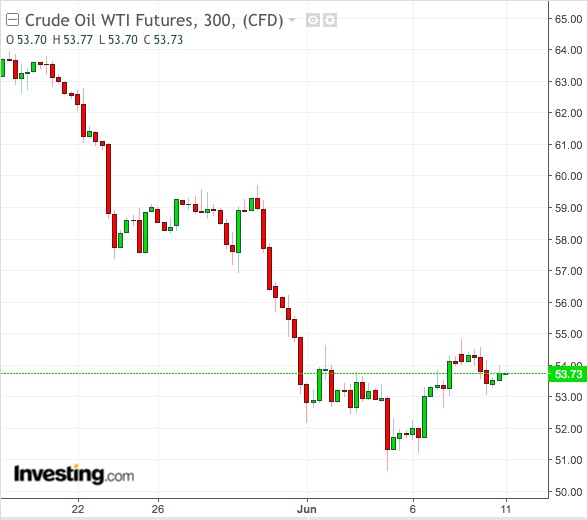The melody was in place. All the Russians had to do was sing along with the Saudis. Yet the song that emerged in the end was barely in tune with OPEC’s needs.
We’re talking about the production cuts agreement of OPEC +10—the oil price support mechanism between the Saudi-led Organization of the Petroleum Exporting Countries and their ten oil-producing allies headed by Russia.
With just two weeks to a scheduled meeting of OPEC members on June 25, and the alliance a day later, the Russians have been slow in expressing their support for the production cuts the Saudis say are needed in the second half of the year to prevent another oil price crash.
Missed Opportunity To Extend Oil Rally After Mexican Tariff Relief
Coming on the heels of U.S. President Donald Trump’s 11th hour decision not to impose tariffs on Mexico, the Russian response—or lack thereof—cost OPEC and oil bulls the opportunity to push oil prices higher on Monday after the about-turn by the U.S. President.

U.S. West Texas Intermediate crude settled down 1.3% on Monday, after the 4% comeback rally in the last two sessions when Trump’s position shift on Mexico was first reported. Brent, the U.K.-traded global benchmark for oil, fell 1.6% on Monday, giving up a similar 4% gain from the two earlier sessions. Wall Street’s key stock indices, in contrast, rose about 1% on Monday as equity traders celebrated Trump's decision on Mexico.
While oil prices did rise in Tuesday’s Asian trading, the recovery seemed fragile.
OPEC Will Let Russia Work Out Its 'Dynamics' First
Saudi Energy Minister Khalid al-Falih, the most influential oil minister within OPEC, validated the oil market’s concerns over Russia on Monday when he acknowledged that the “remaining country to jump on board (for extension of production cuts) now is Russia."
“I will wait for the Russian dynamics to work themselves out,” Falih said in an interview with Moscow-based news service Tass. “There is debate obviously within the country about the exact volume that Russia should be producing in the second half.”
The chief executive of Russia’s Rosneft (OTC:OJSCY), the world’s largest petroleum company, is among those trying to convince Moscow not to do another production cut deal with OPEC, warning that his country will lose market share of its oil to the U.S. by curbing more exports. Igor Sechin’s caution came after U.S. crude production ramped up last month to reach record highs of 12.4 million barrels per day. U.S. crude exports have, meanwhile, touched 3.4 million bpd, nearing previous peaks of 3.6 million bpd as Saudi and Russian cuts took effect.
The world knows that it took disciplined production cuts of at least 1.2 million barrels per month by OPEC +10 since December—mostly contributed by the Saudis—to give oil its astounding rally of more than 40% in the first four months of this year. That was before the recent selloff sparked by the Mexican tariffs talk, surging U.S. crude production and stockpiles, and the ever-worsening U.S.-China trade war. It is also widely acknowledged that without the Russians, OPEC might not be OPEC anymore.
Russia Doing More Damage To Oil Prices In The Interim
Even so, the Russians are doing more damage than help to oil now.
On Monday, Moscow’s top negotiator to OPEC, Energy Minister Alexander Novak, went off on a completely unexpected tangent by suggesting that crude could even fall to $30 a barrel without a new production cut deal.
Even if this is true and acknowledged by both the bulls and bears, it’s hardly the kind of thing the market should be hearing from OPEC’s top ally.
In fact, one could flip Novak’s logic on its head to ask: is that all that oil is fundamentally worth now, ahead of the most intense period for fuel demand in the United States—the peak summer driving season?
To make matters worse, the Russian energy minister said there was a “need to monitor (the) oil market to take a balanced decision in July."
Will Russia And OPEC Act Before Trump Throws Another Curveball At The Oil Market?
Novak’s "July” mention raised more red flags for wary hedge funds and other traders in oil as the Russians have been insidiously pushing for the OPEC +10 talks to be delayed till then, while the Saudis are determined to stick to the June schedule. Iran, a key member of OPEC but under U.S. sanctions that prevent its oil from being freely exported, has also opposed moving the meeting in July.
With all the behind-the-scenes cloak-and-dagger action expected between now and the next two weeks at OPEC, one should ask if the cartel and the Russians really want to miss making up for the double-digit losses of May, when crude’s short-sellers fundamentally have relatively fewer bullets to fire in the summer?
It’s a pertinent question because Trump, the biggest disruptor of oil prices this year, could yet throw another curveball at the market.
